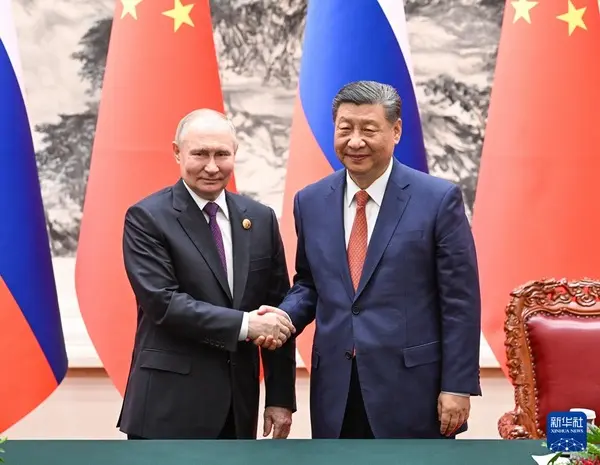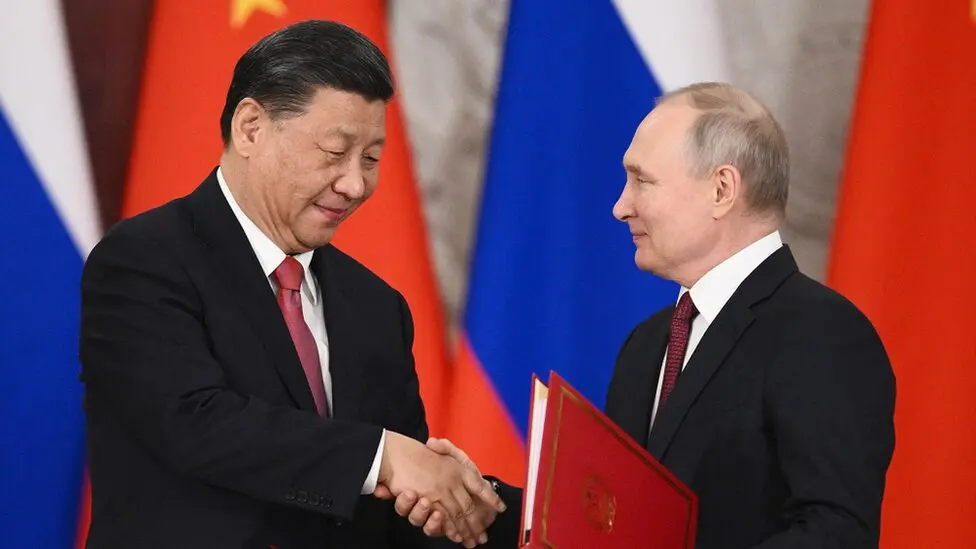10 Troubling Insights on the Rising China-Russia Alliance on Peace in Ukraine Crisis

China-Russia alliance for peace in Ukraine Photo: Perplexity 8/8/2025
August 8, 2025 Hour: 7:38 pm
Presidents Xi Jinping and Vladimir Putin reinforce the China-Russia alliance to promote peace in Ukraine, deepening strategic ties amid global tensions and upcoming Shanghai Cooperation Summit.
Related: Modi to Visit China for First Time in Seven Years as U.S. Trade Tensions Mount
10 Critical Insights on the Rising China-Russia Alliance for Peace in Ukraine Crisis
The China-Russia alliance for peace in Ukraine has taken center stage following a significant exchange between Chinese President Xi Jinping and Russian President Vladimir Putin on August 8, 2025. This high-level conversation reaffirmed their joint commitment to advance dialogue and diplomatic efforts aimed at resolving the Ukraine conflict, while reinforcing their robust bilateral cooperation in a complex global environment.
This article expands on the conversation’s key points, the strategic implications for the region and international diplomacy, and the broader geopolitical framework where this alliance operates. It also explores the upcoming Shanghai Cooperation Organization (SCO) Summit in Tianjin as a pivotal platform for consolidating their partnership.

The China-Russia Alliance for Peace in Ukraine: Joint Commitment and Reinforced Strategic Cooperation
At the heart of their dialogue, Presidents Xi Jinping and Vladimir Putin emphasized the necessity of diplomatic engagement to address the protracted Ukraine crisis. President Xi underscored that the complexities of the conflict “do not have simple solutions,” advocating for peaceful negotiations that respect the interests of all involved parties. His remarks highlighted Beijing’s steadfast approach to promoting political pathways that prioritize peaceful resolution over military escalation.
President Putin, reciprocating this approach, praised China’s constructive involvement in seeking a political solution. He reaffirmed the depth of the strategic alliance between Moscow and Beijing, stating unequivocally that this partnership “will not change under any circumstances.” This firm declaration signals an enduring bilateral relationship anchored not only in economic interests but also in shared geopolitical objectives.
Both leaders agreed to maintain close and active communication channels to enhance their political coordination. This cooperation extends beyond Ukraine, covering wider dimensions of international affairs where their aligned interests shape their joint actions on the world stage.
The upcoming SCO Summit, scheduled in Tianjin, was highlighted as a crucial moment to promote unity and strengthen high-quality development cooperation among member countries. The summit is expected to showcase their leadership in fostering multilateralism based on respect, solidarity, and mutual benefit.
This reinforced China-Russia alliance embodies a united front advocating peace in Ukraine while simultaneously deepening their multifaceted partnership.
External Links:
- Shanghai Cooperation Organization Official Website
- United Nations Overview on Ukraine Conflict and Diplomacy
Geopolitical Context: China-Russia Alliance Amid a Complex Global Landscape
The China-Russia alliance unfolds amid a fractured global environment marked by shifting geopolitical alliances and persistent conflicts. The Ukraine war stands as one of the most destabilizing crises, involving competing interests of global powers and regional actors.
Within this intricate context, the China-Russia alliance emerges as a critical actor promoting multilateral diplomacy and conflict resolution approaches that push back against unilateral pressures and sanctions. Both countries share a vision of global governance that prioritizes sovereignty, territorial integrity, and non-interference—a message they consistently deliver in international forums.
The strategic partnership between Beijing and Moscow extends into economic cooperation, energy projects, defense collaboration, and coordinated political messaging. Their unified stance has created a counterbalance to Western blocs, influencing debates on international law, peace enforcement, and security frameworks.
This alliance also reflects growing cooperation within international organizations such as the SCO, where China and Russia drive agendas on security cooperation, economic development, and cultural exchange. The organization’s expanding influence indicates their commitment to shaping a multipolar world order.
The dialogue between the two leaders signals a deliberate effort to maintain stability while navigating global challenges including the Ukraine crisis, economic uncertainties, and evolving alliances.
The China-Russia alliance serves as a pivotal diplomatic axis aimed at fostering peace and stability, not only regionally but on a global scale.
External Links:
- Council on Foreign Relations: China-Russia Relations Overview
- International Crisis Group: Ukraine Conflict Updates
Broader Implications for Ukraine and International Peace Efforts
While the China-Russia alliance strongly advocates for dialogue in Ukraine, the situation remains highly fluid and volatile. The conflict has exacted a heavy toll on civilian populations, infrastructure, and regional security dynamics.
The emphasis by Xi Jinping and Vladimir Putin on inclusivity and respect for all parties’ interests signals a departure from one-sided approaches to peacebuilding. This perspective supports long-term regional stability by encouraging negotiations that include multiple stakeholders and avoid exacerbating divisions.
Their cooperation may also influence other international actors, including Western countries and regional powers, potentially reshaping diplomatic alignments or prompting renewed peace talks under multilateral frameworks.
The Shanghai Cooperation Organization’s upcoming summit will likely serve as a forum not only for strengthening China-Russia ties but also for broader regional discussions on conflict resolution, economic resilience, and security cooperation.
Given their combined economic and political influence, China and Russia’s leadership in this area carries considerable weight, with the capacity to push forward peace initiatives or adapt strategies to evolving global challenges.
Conclusion
The renewed China-Russia alliance for peace in Ukraine affirms a shared commitment to diplomatic solutions amidst complex international tensions. Their dialogue exemplifies a strategic partnership that transcends traditional bilateral relations, focusing on peace promotion, multilateral cooperation, and global stability.
As the world watches the unfolding developments in Ukraine, the joint leadership role of China and Russia will remain a defining factor in shaping the conflict’s trajectory and the broader international order.
The upcoming Shanghai Cooperation Organization Summit in Tianjin promises to be a critical platform to advance this agenda, reinforcing solidarity and cooperation that could herald a new phase in global diplomacy.
Author: JMVR
Source: Agencias

